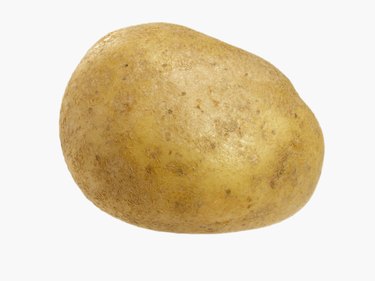
Genetically modified potatoes are on the way to market as of 2015. The U.S. government has deemed GM foods safe, but not all scientists agree. There is no legislation requiring the labeling of GMO foods, and critics worry about potential contamination of the conventional food supply and the safety of increased herbicide use. If you'd prefer to avoid GM potatoes, it's crucial to know which varieties are headed to the market.
Genetic Engineering 101
Video of the Day
Genetic modification involves removing genetic material from one organism and transferring it to the genetic code of another. In food agriculture, this is done for reasons such as to increase the crop's resistance to insects, viruses, diseases and herbicides. For example, to increase resistance to insects, the toxin-producing gene from the bacterium Bacillus thuringiensis is inserted into the genetic code of the crop. This toxin is safe for humans to consume, according to the U.S. Food and Drug Administration.
Video of the Day
Varieties of GMO Potatoes
The FDA completed its evaluation of GM potato varieties collectively known by the trade name Innate, according to a March 2015 FDA press release. Safety evaluation of GM foods includes toxicity, allergic potential, stability of the inserted gene, nutritional properties and unintended side effects. The GM varieties approved include Ranger Russet, Russet Burbank and Atlantic, produced by J.R. Simplot Co. The potatoes have been genetically modified to reduce black spots and bruises by lowering certain enzymes. These varieties have also been also modified to produce less acrylamide -- a potentially cancer-causing chemical that forms when starchy foods are heated at high temperatures.
Red Flag, Says Industry Watchdog
Food-safety advocates have expressed concern regarding the GM potato varieties that are ready to hit the market. The varieties use a new form of genetic engineering known as RNA interference, according to the Center for Food Safety, an industry watchdog. In a press statement released in March 2015, Andrew Kimbrell, the center's director, said the consequences of this new form of genetic engineering are not yet well understood and referred to the introduction of GM potatoes as "risky." The center favors labeling GM foods so that consumers know which foods contain GMOs.
Some Food Suppliers Say No
Research submitted to the FDA by Simplot to gain approval has not been made public. But a study published in the October 2014 issue of the journal Regulatory Toxicology and Pharmacology found no human safety concerns when it evaluated a different type of GM potato. Still, the industry remains divided. ConAgra Foods and McCain are among the food suppliers that say they won't use GM potatoes, according to a March 2015 Chicago Tribune article. Food chain McDonald's has also rejected Simplot's GM potatoes.
- World Health Organization: Frequently Asked Questions on Genetically Modified Foods
- U.S. Food and Drug Administration: FDA Concludes Arctic Apples and Innate Potatoes Are Safe for Consumption
- Center for Food Safety: Genetically Engineered “Botox Apples” and “Concealer Potatoes” Coming to Supermarket Near You
- Regulatory Toxicology and Pharmacology: Compositional and Toxicological Analysis of a GM Potato Line With Reduced Α-solanine Content -- a 90-Day Feeding Study in the Syrian Golden Hamster
- Chicago Tribune: FDA Approves Genetically Engineered Potatoes, Apples as Safe